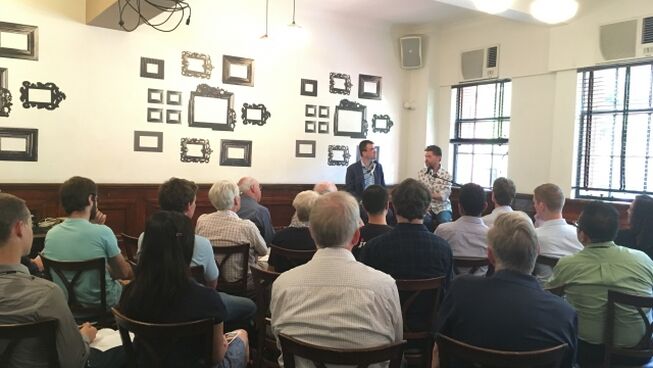What is truth in a world of fake news and alternative facts? We confront some of the mind bending challenges truth and language pose and discover an even bigger truth that is relevant for our lives today.
Our guest: Dr. Ryan Young is the Director of the National Security College Futures Hub. He has worked across multiple Departments in the Australian Public Service and also has a PhD in philosophy and logic
This conversation was recorded live in Canberra in September 2019 in partnership with the Simeon Network.
Invest in Bigger thinking for as little as US$1 per podcast on Patreon.
Bigger Questions asked in this conversation
Ryan - you work with the National Security College. What does that mean? Is not connected to national security is it?
Smaller Questions
Today we’re asking Dr. Ryan Young about the truth. So Ryan our smaller questions to you are about ‘lying’.
Introduction to truth - liar paradox
So Ryan, your PhD research was in lying, and in particular something known as the ‘liar paradox’, so can tell us a bit about your research - what exactly is the liar paradox?
What exactly is a paradox? Is it something that is true and false at the same time?
Why is the ‘liar paradox’, a paradox?
Isn’t the liar paradox just a linguistic error?
So why did you spend 3-4 years of your life wrestling with this?
So what did you discover?
Ways of searching for truth
So what does it then mean that something is true?
What does this mean for the relationship between language and truth? Is it therefore a bit complicated?
Language - way of expressing truth.
What about science? Surely that’s a more certain and robust method of determining truth, indeed atheist philosopher Dan Dennett once said,
There is no better source of truth on any topic than well conducted science.
And fellow atheist Sam Harris also claimed that
Science represents our best efforts to know what is true in the world.
So is there no better source of truth on any topic than well conducted science?
So is truth elusive?
Can we ever know the truth?
Humility
The idea of epistemic humility is found in the Bible, for example, Psalm 131:1, the Psalmist writes - I don’t concern myself with things that are too wonderful for me. It seems that the Psalmist acknowledges that there are just things they can’t know, so is it a part of the biblical worldview to accept that as humans we can’t know everything?
So what does it mean when we can’t know everything?
But does that mean that Christians are content with ignorance and not wanting to push the boundaries of human knowledge?
Bible’s answer - truth in Jesus
Today’s big question is ‘What is truth?’ and this is the very question that Roman Governor Pontius Pilate asks Jesus in John 18:38 where he is being being interrogated and tried. He asks this question because Jesus has answered another of Pilate’s questions about if he was a king, by saying,
“You say that I am a king. In fact, that’s the reason I was born. I was born and came into the world to be a witness to the truth. Everyone who is on the side of truth listens to me.”
So what was Jesus saying about the truth?
When it comes to truth, Jesus Christ, in the pages of the Bible makes an even more radical claim. Whilst he claims to be a witness to the truth, he says more, he doesn’t just claim to know the truth, or speak the truth, but in John 14:6, he claims to be the truth.
Jesus answered, “I am the way and the truth and the life.”
Isn’t claiming to ‘be’ the truth fairly egotistical?
In what way is Jesus therefore ‘the truth’?
But why should we believe Jesus is telling the truth? Wouldn’t this make another great ‘would I lie to you’ story? ‘I once convinced a group of 12 disciples that I was truth embodied in human form’?
Truth is embodied: Personal answer
Why do you believe that Jesus and the Christian message is the truth?
The Big Question
So Ryan, what is truth?





